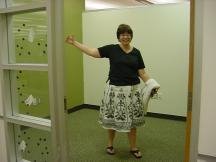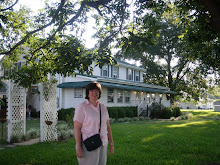After reading the different perspectives on Library 2.0 in the OCLC Newsletter, the Wikipedia entry and some of it's blogography entries, I can see that some people take this stuff fairly seriously and write thoughtfully about the topic. The Blogs I've surfed to then skimmed through can be informative and the response-comments useful. Library 2.0 does go beyond Good Reads (so-long, high school fun!). I might start to argue in my mind with some of of the views expressed, but I sort of give up as not worth the effort. I guess I'm getting a bit past impassioned discussions about the shape of the future ( so-long college fun!)
The quote/idea/definition that most resonanted with me, also gave me an idea (which I immediate thought, duh? Why didn't I think of that before?) I'm lifting only the first line from the quote because I'm less and less in agreement as she elaborate and mentions specfics, but here is Sarah Horton as quoted in Blyber's "11 reasons why Library 2.0 exists and matters" (Blyberg.net, accessed July 19th, 2007)
Library 2.0 simply means making your library’s space (virtual and physical) more interactive, collaborative, and driven by community needs.
Yes, this would be helpful. Partly these ideas are already in process under other flags (outreach, education, accountability), but I agree that the website projects I've seen so far, especially such as Flickr, provide any and all with a space and some easy-to-use tools in order to share stuff they've created and so create something new, that is true collaboration.
The idea that I got is simply to make an Armstrong group on Flickr where students, fac, staff alumni can share their Armstrong photos, in order to strengthen the Armstrong community (and its photo collection.) Could Flickr replace the College Yearbook? Maybe not entirely but since the yearbooks are already gone, anything is a worth a try. I wonder what you all think of this idea? I might develop it a bit in a seperate post.
In addition, Horton's quote suggests that "traditional" web-based library tools, such as OPACs or bibliographic database could beneift from addition of social networking's ideas. More chances to "talk back" as in posting a comment; to share what you are doing, such as blogging. What if students posted their bibliographies on the web for all the world to see? Would they take more time creating them? They already share them in order to avoid doing the research....I'm not sure exactly what effect this would have but blogging make me more aware of my reader...even if I don't have one!
I do have some issues with writing from this medium. One is that I couldn't find, or couldn't be bothered to find the original source for the quote above, not unusual maybe but not an improvement on traditional sources!
Thursday, July 19, 2007
Subscribe to:
Post Comments (Atom)



No comments:
Post a Comment